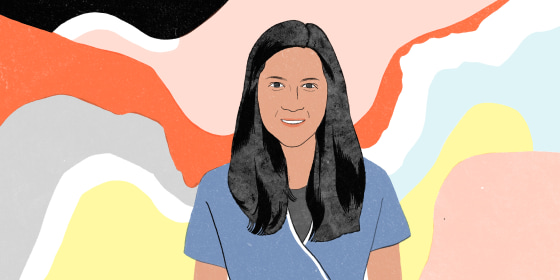Erika Roño has made it a rule in recent weeks to leave behind every aspect of her personal life as soon as she begins her shift at work.
There's no room to entertain thoughts about her monthly bills or even think about how her husband is doing at home. Once she walks through the doors at Johns Hopkins Hospital in Baltimore, she can't afford to focus on anything else except her duties as an emergency room nurse.
The coronavirus pandemic has induced a new level of anxiety for Roño as the number of confirmed cases in the United States has skyrocketed to more than 1 million and more than 61,000 Americans have died over the last few months.
"The virus doesn't have a mind of its own, so it doesn't discriminate," she said. "I just look at a patient knowing that this could be me tomorrow if I'm not careful or if my resistance goes down or I'm just unlucky. This could be me tonight. And that's the scary part of it."
Roño, 32, an ER nurse at Johns Hopkins Hospital and a vascular access nurse at Johns Hopkins Bayview Medical Center in Maryland, arrived in the U.S. in 2014 and is one of an estimated more than 150,000 Filipino nurses in the U.S. who continue to work in the field as the pandemic continues.
She considers herself fortunate to work at a place that provides sufficient protective personal equipment for medical professionals, but she said she's disappointed in America's fragmented response to the crisis.
"Coming from the Philippines, you hear about the United States being a superpower. We can do a lot of great things, and this is happening. Why is this happening?" she said.
Maryland has more than 20,000 confirmed cases and more than 900 confirmed deaths. And both the hospital and the medical center have continued to see rises in admissions of coronavirus-positive people, Roño said.
Work life has changed drastically for Roño, who has been at Johns Hopkins Hospital a little more than five years. She said she typically sees 12 to 16 patients during an average shift. But amid the pandemic, she's seen up to 35 patients a day, including those who are COVID-19-positive.
Because of the sheer number of COVID-19 patients, she and her colleagues engage in an approximately five-minute process to put on protective gear: gloves, powered air-purifying respirator hoods – or an N-95 mask and face shield — gowns and an additional set of gloves. Shoe covers aren't mandatory, but she chooses to wear them.
It's not a completely new process, she said — it's one she's had to do when she's dealt with tuberculosis patients. What worries her is the sheer number of COVID-19 patients Johns Hopkins sees that requires her and her colleagues to prepare so extensively.
The hospital's and the medical center's efforts to minimize contact between medical professionals and coronavirus patients have been an adjustment for Roño, as well. While treating unstable patients normally requires a team of seven to eight medical professionals, thet number has been reduced to four. She said she once spent four hours stabilizing a single patient without the help she normally has.
Health care workers account for 10 percent to 20 percent of coronavirus cases in the country. Roño has so far managed to remain unscathed despite having intubated multiple COVID-19 patients. But she said she knows of three doctors she worked with in the Philippines who have died from the virus.
It's not only work that Roño has had to adjust to. Her personal life has also been affected. She and her husband had been trying to start a family, but they paused because they worry that it may not be safe to bring a child into the world at this time, she said.
The many unknowns and rapidly evolving findings about the coronavirus have been the most challenging aspect of the crisis for Roño. She said Johns Hopkins last month began screening for gastrointestinal symptoms when testing patients for the contagious disease.
The one thing she said she does know is that social distancing measures have been effective. She encourages the public to continue distancing to keep the health care system from becoming overwhelmed.
Despite uncertain times,Roño said it's fulfilling to be an ER nurse and part of a team that helps save lives.
"People come to us on the worst day of their lives, and we don't get to see the tail end of it, but you get to see them live," she said. "You got to ship them off to the ICU, and you know there's hope for them to see another day. And you're part of that, and that's a pretty big deal."
This story is part of our Asian Pacific American Heritage Month series, "AAPI Frontline," honoring essential workers who are serving their communities during the coronavirus pandemic. Read more here.
Follow NBC Asian America on Facebook, Twitter and Instagram.
